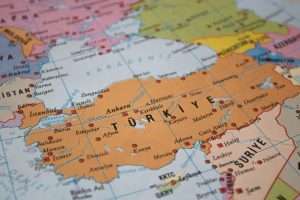Gateway to the Gulf: Saudi Arabia’s Role in International Trade

Saudi Arabia
Saudi Arabia, strategically positioned at the crossroads of Asia, Africa, and Europe, plays a pivotal role as the gateway to the Gulf region. With a robust and dynamic economy, the Kingdom has emerged as a key player in international trade, facilitating the exchange of goods and services on a global scale. In this article, we will explore the multifaceted aspects of Saudi Arabia’s role in international trade and the factors contributing to its prominence on the world stage.
Strategic Geographical Location
Nestled between the continents of Asia, Africa, and Europe, Saudi Arabia enjoys a geographically advantageous position. The Kingdom’s proximity to major shipping routes, including the Red Sea and the Arabian Gulf, makes it a natural hub for trade between East and West. Its strategic location has turned Saudi Arabia into a critical link in the global supply chain.
VISA FOR SPIRITUAL JOURNEY TO SAUDI ARABIA
Connectivity through Transportation Infrastructure
Saudi Arabia has invested heavily in developing a world-class transportation infrastructure, further enhancing its role in international trade. Modern airports, seaports, and an extensive road network facilitate the seamless movement of goods within the country and across borders. Key transportation hubs, such as King Abdulaziz Port in Dammam and King Khalid International Airport in Riyadh, contribute to the efficiency of trade operations.
Free Trade Agreements
The Kingdom has actively engaged in establishing free trade agreements (FTAs) with countries around the world. These agreements eliminate or reduce trade barriers, fostering economic cooperation and facilitating the flow of goods and services. FTAs with major economies, such as the United States, China, and the European Union, position Saudi Arabia as an attractive destination for international businesses seeking market access.
Economic Diversification and Vision 2030
Vision 2030, Saudi Arabia’s ambitious blueprint for economic transformation, places a strong emphasis on diversifying the economy and reducing dependence on oil revenue. As a result, the Kingdom is actively seeking to expand its non-oil sectors, including industries, services, and technology. This diversification drive creates new opportunities for international trade, encouraging foreign investment and collaboration across various sectors.
Investment in Logistics and Warehousing
To support the growing demands of international trade, Saudi Arabia has invested in state-of-the-art logistics and warehousing facilities. Modern logistics parks and warehouses equipped with advanced technology contribute to the efficiency of supply chain management. These facilities cater to the needs of businesses engaged in import and export activities, facilitating the movement and storage of goods.
Digital Transformation and E-Commerce
The Kingdom’s commitment to digital transformation is reshaping the landscape of international trade. E-commerce platforms and digital trade solutions are gaining traction, enabling businesses to engage in cross-border transactions seamlessly. The Saudi government’s investment in digital infrastructure and smart technologies aligns with global trends in digital trade and positions the Kingdom as a technologically advanced trading partner.
Energy Export and Petrochemical Industries
As a major oil-producing nation, Saudi Arabia has long been a key player in the global energy market. The export of oil and petrochemical products contributes significantly to the Kingdom’s international trade revenue. Investments in downstream industries, such as refining and petrochemicals, further diversify the range of products contributing to international trade flows.
Participation in Global Organizations
Saudi Arabia actively engages in international trade discussions and collaborations through its involvement in global organizations. The Kingdom is a member of the World Trade Organization (WTO), the Arab League, and the Gulf Cooperation Council (GCC), among others. Such affiliations enable Saudi Arabia to contribute to global trade policies and benefit from a network of economic partnerships.
Promotion of Small and Medium Enterprises (SMEs)
Recognizing the importance of SMEs in driving economic growth and international trade, Saudi Arabia has implemented initiatives to support and promote small businesses. These initiatives include financial support, training programs, and market access facilitation, encouraging the participation of SMEs in the global marketplace.
Challenges and Future Prospects
While Saudi Arabia’s role in international trade is substantial, it is not without challenges. Geopolitical uncertainties, fluctuating oil prices, and global economic conditions can impact trade dynamics. Additionally, the Kingdom is actively working to address regulatory complexities and streamline processes to further enhance the ease of doing business.
Also read: Beyond Business Class: Luxury Travel Experiences in Saudi Arabia





